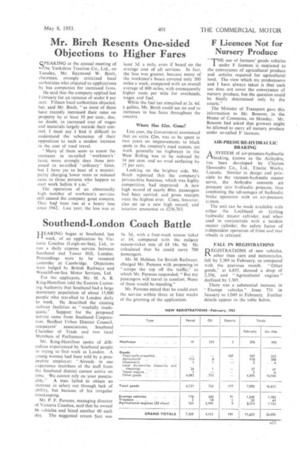Southend-London Coach Battle
Page 27

If you've noticed an error in this article please click here to report it so we can fix it.
j_lEARING began at Southend, last
1week, of an application by Victoria Coaches (Leigh-on-Sea), Ltd., to run a daily express service between Southend and Tower Hill, London. Proceedings were to be resumed yesterday at Cambridge. Objections were lodged by British Railways and Westcliff-on-Sea Motor Services, Ltd.
For the applicants, Mr. • M. A. B. King-Hamilton told the Eastern Licensing Authority that Southend had a large dormitory population of about 15,000 people who travelled to London daily to work. He described the existing railway facilities as "woefully inadequate." Support for the proposed service came from Southend Corporation. Benfleet Urban District Council. ratepayers' associations, Southend Chamber of Trade and two local Members of Parliament.
Mr. King-Hamilton spoke of difficulties experienced by Southend people in trying to find work in London. A oung woman had been told by a prospective employer: "Already in our experience members of the staff from the Southend district cannot arrive on time. We cannot rely on your punctu ality." A man failed to obtain an increase in salary not through lack of ability, but because of his irregular timekeeping.
Mr. P. F. Parsons, managing director. of Victoria Coaches, said that he owned 86 vehicles and hired another 40 each day. The suggested return fare was with a four-week season ticket at £4, compared with the railway season-ticket rate of £41 18s. 9d. He calculated that he could carry 700 passengers.
Mr. M. Holmes, for British Railways, charged Mr. Parsons with proposing to "scrape the top off the traffic," to which Mr. Parsons responded: "But my passengers will travel in comfort. None of them would be standing."
Mr. Parsons stated that he could start the service within three or four weeks of the granting of the application.












































































